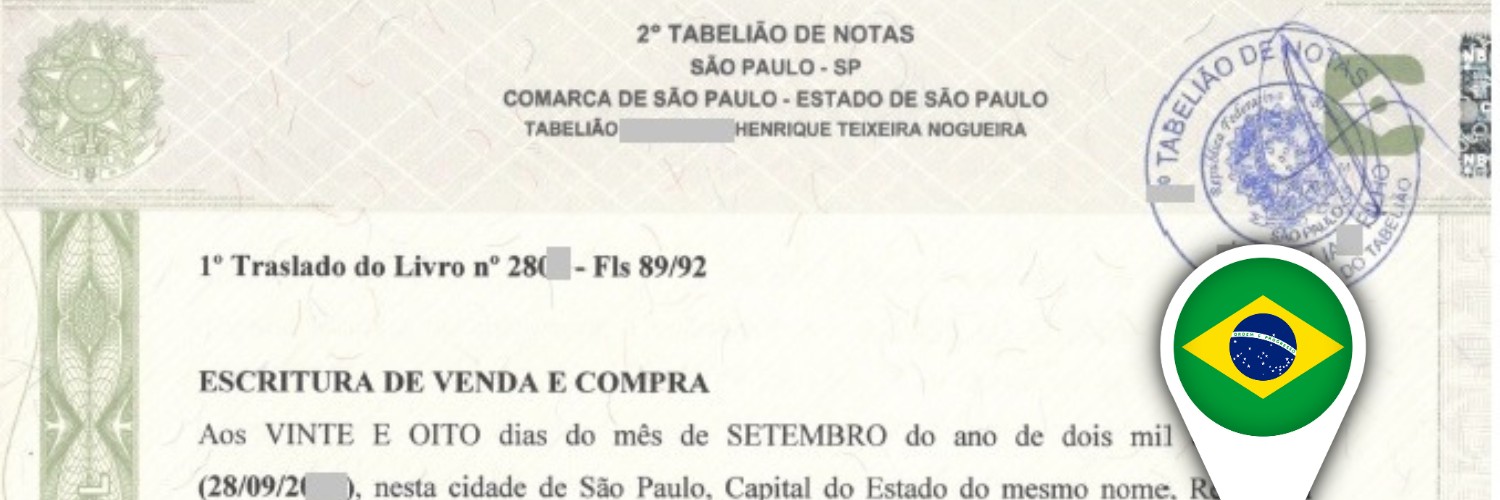How to Review the Public Deed of Sale (Escritura) in Brazil

Buying a property in Brazil can be both an exciting venture and a labyrinthine process. One of the most important documents in this procedure is the public deed of sale, known locally as the escritura. This document, which seems quite straightforward, can, in fact, contain a myriad of potential pitfalls, risks, and hidden issues. Therefore, having it thoroughly reviewed by a licensed Brazilian attorney with experience in real estate transactions is not just a recommendation—it’s practically essential.
Escritura as the foundation for the transfer of ownership
At first glance, an escritura outlines the basic details of the property transaction: information about the buyers, sellers, transaction amounts, and the property description. However, a more in-depth look can reveal discrepancies or omissions that might affect the transaction’s validity. Errors in names, incorrect property boundaries, or vague descriptions can lead to disputes and legal challenges in the future.
Need help?
Schedule a Consultation Now!
These are five of the main reasons why an escritura must be reviewed prior to closing:
1. Seller Representations
The escritura also includes vital representations that sellers make about the property. These assertions essentially guarantee the buyer against future claims of ownership from third parties. Imagine the distress of purchasing a home, only to have someone appear months or years later, claiming they have a prior or stronger claim to the property. Seller representations in the deed are the buyer’s primary shield against such scenarios.
2. Certidões Negativas: Your Assurance of Clean Transactions
Integral to the public deed of sale are the certidões negativas, which are essentially certificates attesting to the absence of debts or legal issues associated with the property or the seller. But here’s the catch—it’s not uncommon for some of these certificates to be missing, or for them to reveal problems. Occasionally, certain challenges or issues might be disclaimed in the escritura. Signing such a deed means you’re consciously taking on the risks associated with the disclosed problems. An attorney would flag these disclaimers and guide you on the potential ramifications.
3. Avoiding Real Estate Fraud
Brazil, like many other jurisdictions, is not immune to real estate fraud. Unscrupulous sellers, forged documents, or properties sold without the legitimate owner’s knowledge are all real challenges. Given these potential threats, reviewing the escritura can be a crucial line of defense against fraudulent transactions.
4. Litigation: A Long and Winding Road
It’s essential to grasp the reality of Brazil’s judicial system. Litigations, especially those related to property disputes, are notorious for their lengthy durations. It’s not unusual for court cases to drag on for over a decade. If a buyer is deceived in a real estate transaction, seeking legal recourse is not only expensive but also mentally and emotionally draining.
5. The Cost-Effectiveness of Early Legal Review
Considering the potential challenges mentioned, it’s evident that hiring an attorney for an early review of the escritura is a sound investment. When you contrast the modest fee for such a review with the potentially staggering costs of future litigation, the decision becomes straightforward. Furthermore, the peace of mind knowing that a professional has scrutinized your transaction’s details is invaluable.
Bottomline
The old adage, “An ounce of prevention is worth a pound of cure,” rings especially true in Brazilian real estate transactions. While Brazil offers a myriad of opportunities for property investment, it’s crucial to approach these ventures with an informed and cautious mindset. The review of the public deed of sale, the escritura, is a critical step in ensuring that your investment is secure. Entrusting this review to a seasoned Brazilian real estate attorney can be the difference between a successful, hassle-free property acquisition and a tangled web of legal complications. Your property investment deserves nothing less than the highest level of diligence and professionalism.

Seven Objective Aspects of the Escritura Review
A Brazilian real estate lawyer will usually have a methodology to tackle the review of the escritura. Some of the items customarily addressed in such review are:
1. Parties’ Information Accuracy
A lawyer will verify the names, CPF (tax identification number) for Brazilian residents, and passport numbers for foreigners, ensuring that both the buyer’s and seller’s details are correctly and comprehensively listed. This includes ensuring that any representation made on behalf of a company or an estate is properly authorized.
2. Property Description and Boundaries
The document should have a clear and accurate description of the property, including its exact location, size, boundaries, and any relevant features. Any vagueness or discrepancy can lead to future disputes or challenges.
3. Seller Representations
These are the guarantees made by the seller regarding the property’s status. The attorney will ensure that the representations explicitly state that there are no third-party claims on the property and that the seller has the right to sell.
4. Disclaimed Certidões Negativas
The attorney will scrutinize all the accompanying certidões negativas to confirm that there are no pending debts, legal issues, or encumbrances tied to the property or the seller. They will also ensure that no disclaimers or missing certificates compromise the transaction’s integrity.
5. Payment Terms and Conditions
The escritura should detail the payment structure, including the amount, method of payment, and any conditions tied to the transaction, such as penalties for late payment or provisions for contingencies.
6. Absence of Fraudulent Content
A seasoned lawyer will evaluate whether the property’s stated value in the deed aligns with its market value. This can be pivotal in cases where the stated value is suspiciously low, possibly indicating tax evasion or fraud.
7. Conditions Precedent and Subsequent
These are specific conditions that need to be met either before the transaction is finalized or after it takes place. The attorney will ensure that these conditions are fair, legal, and in the best interest of their client.
Need a Public Deed of Transfer Reviewed?
We Can Help You
[email protected]
(214) 432-8100
+55-21-2018-1225
#1 Contact us to get a free quote, or
#2 Schedule a Consultation now.
Common Questions

1. What is an “escritura” in Brazil?
The “escritura” is the public deed of sale, a legal document that formalizes the purchase or sale of real estate in Brazil.
2. Why should a foreign citizen have the “escritura” reviewed by a lawyer prior to signing it?
Reviewing ensures that all legalities are met, and you are fully aware of what you’re entering into, reducing potential future disputes.
3. Can I review the escritura myself?
It’s recommended to have an experienced Brazilian attorney conduct the review due to the complexities involved.
4. Why is it important to check the seller’s details?
Verifying seller’s details confirms the legitimacy of the transaction and ensures the seller has the legal right to sell.
5. What are the “certidões negatives”?
They are negative certificates supporting that there are no major outstanding debts or legal issues linked to the property or seller.
6. Is it common to find problems in “certidões negatives”?
Issues can arise, which is why a thorough review is essential. Some problems can be minor, but others might compromise the transaction.
7. What happens if there’s a discrepancy in the property description?
Discrepancies can lead to legal disputes or transaction nullification. It’s vital to ensure the described property matches what’s being sold.
8. Why are seller representations crucial in the escritura?
They provide the buyer with legal recourse if future ownership claims or undisclosed liabilities surface post-transaction.
9. What does it mean if a problem with the “certidões negativas” is disclaimed in the escritura?
If you sign an “escritura” with a disclaimer, you acknowledge awareness of the issue and assume all associated risks.
10. What should I know about real estate fraud in Brazil?
Real estate scams, unfortunately, occur, emphasizing the importance of verifying all details in the escritura.
11. Is it costly to hire an attorney just for reviewing the “escritura”?
While there’s a fee involved, it’s affordable compared to potential future litigation costs stemming from a flawed transaction.
12. How long does the escritura review process take?
The duration varies depending on the property’s history and complexity, but a thorough attorney review usually takes a few days.
13. Do I need to be present during the review?
Not necessarily. A lawyer should be able to handle the process remotely on your behalf.
14. Can I renegotiate terms after reviewing the “escritura”?
Yes, if discrepancies or issues arise, you can address them with the seller before finalizing the purchase.
15. What are land-use restrictions?
They determine how a property can be developed or modified, crucial for buyers with specific intentions for the property.
16. How do I ensure the property isn’t subject to future claims?
Checking for seller representations in the escritura does not “ensure” anything, but it does provide a safety net, as it holds sellers accountable for future claims.
17. What if I find an issue after the sale is complete?
Addressing it beforehand is easier, but post-sale, you’d likely need to pursue legal action based on the “escritura” clauses.
18. What if the “escritura” lacks certain certificates or verifications?
The document might be legally void or expose you to risks. Address missing items before proceeding.
19. How often do property disputes arise in Brazil?
Unfortunately, they happen more often than foreign citizens imagine. Hence, the emphasis on rigorous document scrutiny.
20. How are payment terms reviewed in the “escritura”?
The attorney will verify payment amounts, methods, and schedules to ensure they align with the agreement.
21. Is the escritura different for commercial and residential properties?
The fundamental principles remain similar, but specific clauses or requirements might differ based on the property type.
22. What if the escritura mentions rights or conditions I wasn’t informed of during negotiations?
Any surprise clauses or conditions should be discussed and clarified with the seller immediately to avoid future complications.
23, Can I get an English translation of the escritura?
While the official document is in Portuguese, your attorney can provide an accurate translation to ensure understanding.
24. What happens if the escritura isn’t registered with the local property registry?
Without official registration, the property transfer isn’t legally recognized, making it imperative to ensure its completion.
25. Is there a grace period to address concerns after the escritura has been signed?
Once the document is signed and registered, changes become more complex. Addressing concerns beforehand is crucial.
26. If I’m buying property jointly, how is this detailed in the escritura?
The document will specify ownership percentages or rights of each party, making clarity on this front essential.
27. How does the escritura handle shared amenities or common spaces in housing complexes?
It outlines the rights and responsibilities concerning shared spaces, ensuring clarity on usage and maintenance aspects.
28. Does the escritura provide a history of the property’s past transactions?
While it primarily focuses on the current transaction, it may reference the immediately preceding deed, ensuring continuity in the chain of ownership.
29. How can I ensure that all terms in the escritura are legally binding and enforceable?
An experienced Brazilian attorney will review and confirm the document’s legality and its alignment with current regulations.


